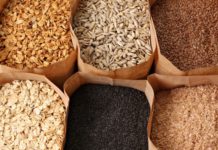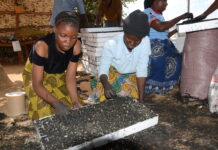The public sector can strengthen local supply chains and help local producers access them by being set targets and annually reporting where food, served in staff canteens for example, comes from.
These are just two of a series of recommendations contained in a new report commissioned by Devon and Somerset County Councils, the Heart of the South West Local Enterprise Partnership, The Cornwall and Isles of Scilly Local Enterprise Partnership and the National Farmers Union.
The report follows a research project conducted by University of Exeter, which sought to understand South West’s food supply chains and the interaction between producers and those involved in food storage and processing, large wholesalers, and public sector organisations.
As part of a “culture change”, catering staff, managers, and chefs should receive extra training on preparing food using seasonal produce and the benefits of using local food and supply chains.
A regional mission statement, committing to local food procurement, should be adopted by all public sector organisations to help drive a positive change in purchasing decisions.
The report also suggests ways major organisations and public bodies in the South West can purchase more from food suppliers and producers based in the region.
The researchers, led by Professor Matt Lobley, concluded that a greater knowledge of food supply chains coupled with these measures would support improved opportunities for farmers and food producers, deliver social and environmental benefits and boost the local economy.
Buying local produce will help the regional economy and can contribute to improved sustainability – buying locally will have a range of environmental benefits including reduced food miles which will also help public sector organisations meet their net-zero targets.
The research involved analysis of the food that public institutions, such as hospitals and schools, buy and in what form– for example already prepared – and how frequently. Researchers also interviewed farmers and food producers.
Their work has included identifying the barriers and benefits of using local food in public sector organisations.
The project is a partnership between, and funded by, Devon and Somerset County Councils, The Heart of the South West Local Enterprise Partnership, The Cornwall and Isles of Scilly Local Enterprise Partnership and the SW National Farmers’ Union (NFU), with the research led by Professor Matt Lobley at the University of Exeter’s Centre for Rural Policy Research. Surveys and interviews took place across Devon, Cornwall and Somerset.
Professor Lobley said: “There needs to be a culture change, within and between, public organisations in the South West. We hope our recommendations will be taken up by the public sector in the region, so the area can be a test bed for potential national change. As this work continues we will share findings with the government and campaign for positive changes, and seek their help to lead this agenda proactively.
“We believe these changes will improve the food system for people, place and planet.”
The report also recommends:
- Tenders put out by the public sector should be more accessible to local producers and suppliers, and procurement contracts should be split into smaller lots to encourage regional food businesses.
- The public sector and other buyers should better accommodate the payment and delivery terms of regional producers.
- Tendering processes should be streamlined, and there should be more transparent engagement with regional producers and suppliers.
- Public organisations should engage with regional producers and suppliers to explain how tenders will be evaluated and allow potential suppliers to shape tender.
- Public organisations should do more to help South West farmers to participate in food supply chains in the region by investing in initiatives such as farmer cooperatives, supply chain collaboration and food hubs. They should explore investing in new regional processing units or distribution centres.
The Heart of the South West LEP has endorsed the recommendations. Chair Karl Tucker said: “The Heart of the South West is home to a large number of the UK’s food producers and farming businesses. By increasing awareness of local food supply chains and by understanding the food requirements of the public sector, we can join up both elements of this market. This will enable public sector decision makers to set targets to support local businesses helping to drive our regional economy and new employment, which is vital for the future of rural communities, farming and the levelling up agenda.”
Mel Squires, Director for NFU SW, and LEP board member said, “Our family farms and local food supply chains are facing a great period of uncertainty and change, therefore any opportunity to produce for their communities, and contribute more sustainability on all fronts (including net zero), has to be an ambition for us all. Through this report, we hope to see greater ambition, collaboration and delivery to really maximise the potential benefits for all – our consumers, economy, farming and food producers.”
Devon County Council will now consider these recommendations. Councillor Rufus Gilbert, Cabinet Member for the economy said: “This research aims to better understand food supply chains in the region with the hope of presenting opportunities for farmers, producers and suppliers to improve their processes while also delivering social, environmental, and economic improvements.
“These recommendations show how in principle a more efficient and resilient supply chain could be created, while also reducing food miles, carbon emissions and improving business productivity at the same time.”
The Cornwall and Isles of Scilly Local Enterprise Partnership which helped co-fund the report, will now work with local and regional partners to see the recommendations implemented. Clare Parnell, board member and rural lead, said: “The public sector, including health and education, is a huge consumer of food but procurement tends to be centralised rather than local. If we can create more opportunities for local farmers and growers, including bringing them together to supply contracts at scale and year-round, it will strengthen the local economy, make our rural businesses more sustainable and by extension allow them to continue to invest in the natural capital that sustains our countryside and visitor economy.”
Councillor David Hall, Somerset County Council Cabinet member for Economic Development, Planning and Community Infrastructure said: “This report and its recommendations represent a step forward for Somerset’s farmers and food producers. Local food consumed locally can support our Net Zero Climate objectives by promoting seasonal menus and reducing food miles; it will also strengthen economic resilience for many small farm businesses in this critical sector for the county. Somerset County Council will work with colleagues to consider the report’s proposals.”
The report is available at https://we.tl/t-9Pb1uznFmJ








